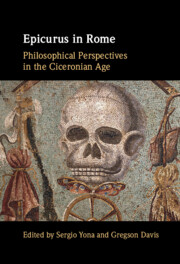Refine search
Actions for selected content:
57 results
Chapter 16 - From Theory to Practice (Mid-45 through March 44)
-
- Book:
- Cicero
- Published online:
- 10 June 2025
- Print publication:
- 29 May 2025, pp 589-615
-
- Chapter
- Export citation
Chapter 13 - Away from Rome (Mid-51–47)
-
- Book:
- Cicero
- Published online:
- 10 June 2025
- Print publication:
- 29 May 2025, pp 486-512
-
- Chapter
- Export citation
Chapter 19 - Conclusion: An Intellectual between Tradition and Power
-
- Book:
- Cicero
- Published online:
- 10 June 2025
- Print publication:
- 29 May 2025, pp 715-726
-
- Chapter
- Export citation
Chapter 11 - Strategies for Coping (May 56 to the End of 54)
-
- Book:
- Cicero
- Published online:
- 10 June 2025
- Print publication:
- 29 May 2025, pp 371-438
-
- Chapter
- Export citation
Chapter 12 - Monuments and Consensus
- from Part II - Translations
-
-
- Book:
- The Roman Republic and Political Culture
- Published online:
- 30 January 2025
- Print publication:
- 06 February 2025, pp 350-373
-
- Chapter
- Export citation
2 - The Pattern of Later Iron Age Societies
-
- Book:
- The Romanization of Britain
- Published online:
- 02 January 2025
- Print publication:
- 16 January 2025, pp 9-39
-
- Chapter
- Export citation
Polyaenus (Strat. 8.23.5) and Caesar's British Elephant
-
- Article
-
- You have access
- Open access
- HTML
- Export citation
Introduction
-
- Book:
- The Politics and Poetics of Cicero's <I>Brutus</I>
- Published online:
- 06 July 2023
- Print publication:
- 20 July 2023, pp 1-19
-
- Chapter
-
- You have access
- Open access
- HTML
- Export citation
Chapter 8 - Minerva, Venus, and Cicero’s Judgments on Caesar’s Style
-
- Book:
- The Politics and Poetics of Cicero's <I>Brutus</I>
- Published online:
- 06 July 2023
- Print publication:
- 20 July 2023, pp 217-243
-
- Chapter
-
- You have access
- Open access
- HTML
- Export citation
Chapter 3 - Caesar and the Political Crisis
-
- Book:
- The Politics and Poetics of Cicero's <I>Brutus</I>
- Published online:
- 06 July 2023
- Print publication:
- 20 July 2023, pp 75-101
-
- Chapter
-
- You have access
- Open access
- HTML
- Export citation
11 - Cicero’s Extremist Ethics
- from Part V - Politics
-
-
- Book:
- Cicero's ‘De Officiis'
- Published online:
- 15 June 2023
- Print publication:
- 29 June 2023, pp 224-242
-
- Chapter
- Export citation
Chapter 10 - Sulla’s Dictatorship Rei Publicae Constituendae and Roman Republican Cultural Memory
- from Part II - Politicising Cultural Memory
-
-
- Book:
- Cultural Memory in Republican and Augustan Rome
- Published online:
- 27 April 2023
- Print publication:
- 11 May 2023, pp 169-182
-
- Chapter
- Export citation
Chapter 16 - The Festival of the Lupercalia as a Vehicle of Cultural Memory in the Roman Republic
- from Part III - Building Cultural Memory
-
-
- Book:
- Cultural Memory in Republican and Augustan Rome
- Published online:
- 27 April 2023
- Print publication:
- 11 May 2023, pp 281-293
-
- Chapter
- Export citation
Chapter 14 - The Making of an Exemplum: Cato’s Road to Uticensis in Roman Cultural Memory
- from Part II - Politicising Cultural Memory
-
-
- Book:
- Cultural Memory in Republican and Augustan Rome
- Published online:
- 27 April 2023
- Print publication:
- 11 May 2023, pp 239-258
-
- Chapter
- Export citation
GREAT EXPECTATIONS: WORDPLAY AS WARFARE IN CAESAR'S BELLVM CIVILE
-
- Journal:
- The Classical Quarterly / Volume 73 / Issue 1 / May 2023
- Published online by Cambridge University Press:
- 07 November 2023, pp. 184-197
- Print publication:
- May 2023
-
- Article
-
- You have access
- Open access
- HTML
- Export citation
2 - Populists before Parties
-
- Book:
- Why Populism?
- Published online:
- 17 March 2023
- Print publication:
- 06 April 2023, pp 24-54
-
- Chapter
- Export citation
Chapter 5 - Caesar the Epicurean? A Matter of Life and Death
- from Part I - Epicurus and Roman Identities
-
-
- Book:
- Epicurus in Rome
- Published online:
- 13 January 2023
- Print publication:
- 09 February 2023, pp 72-86
-
- Chapter
-
- You have access
- Open access
- HTML
- Export citation

Epicurus in Rome
- Philosophical Perspectives in the Ciceronian Age
-
- Published online:
- 13 January 2023
- Print publication:
- 09 February 2023
-
- Book
-
- You have access
- Open access
- Export citation
Introduction
-
- Book:
- Cicero and the People’s Will
- Published online:
- 24 November 2022
- Print publication:
- 08 December 2022, pp 1-14
-
- Chapter
- Export citation
Chapter 5 - Voluntas Populi
- from Part I - The Practice of Voluntas
-
- Book:
- Cicero and the People’s Will
- Published online:
- 24 November 2022
- Print publication:
- 08 December 2022, pp 105-144
-
- Chapter
- Export citation
